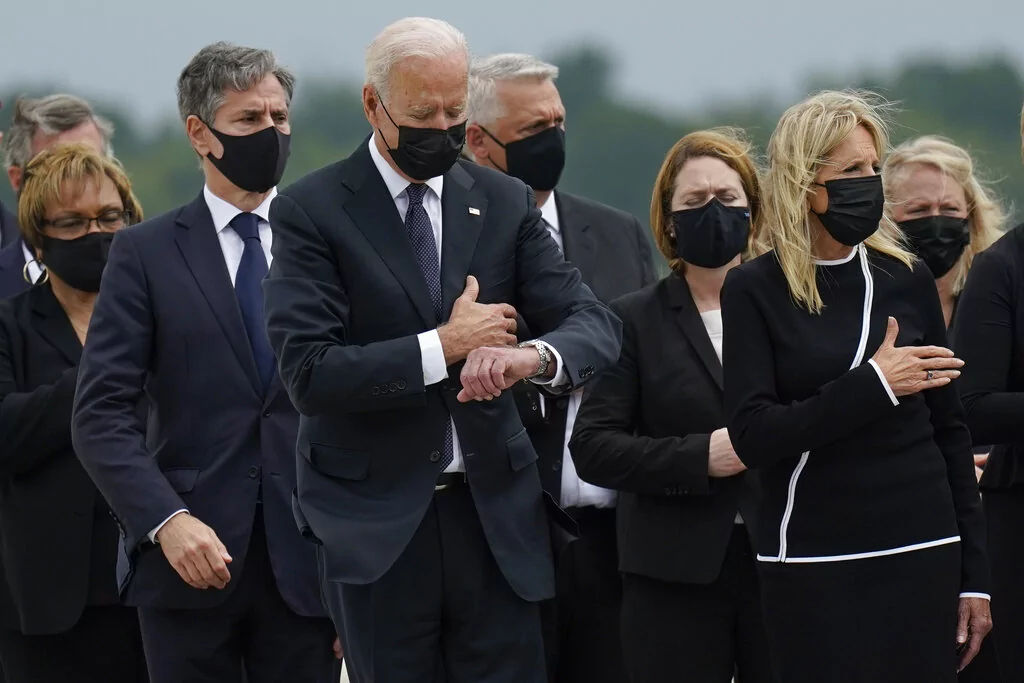

The Republican-led House Foreign Affairs Committee released a lengthy report Sunday on its investigation into the United States’ withdrawal from Afghanistan in August 2021, with the report detailing preparation failures and department-level mistakes that led to the deaths of 13 service members.
The release of the report on the Afghanistan withdrawal investigation, which was started by now-Chairman Michael McCaul when Republicans were in the House minority between 2021 and 2023, is the latest step taken by the House GOP to release information blasting President Joe Biden and Vice President Kamala Harris’s records ahead of the contentious 2024 election.
Republicans were racing against the political clock to release their report before the next Congress, which polling shows could be either party’s game. Though Biden is no longer the Democratic presidential nominee, the report does seek to tie Harris to the decisions of the commander-in-chief, and Foreign Affairs committee staff noted they couldn’t find any evidence that she disagreed with his decisions.
The GOP Foreign Affairs Committee staff told reporters that because the Biden administration has referred to itself as the “Biden-Harris” administration, the committee decided to call the administration as such in their report.
The committee held seven public hearings for their investigation into the withdrawal, as well as conducted 18 transcribed interviews with members of the Biden-Harris administration and military officials in charge of overseeing the withdrawal. The committee noted in its report that it analyzed over 20,000 pages of documents provided by the State Department.
McCaul said in a statement that he would have preferred for the report to be released “earlier than today” and blamed congressional Democrats for providing “political cover” for the Biden-Harris administration.
“Anyone who reads this report will be able to see that we conducted this investigation with integrity, not drawing conclusion ahead of time but rather looking at the facts and evidence we collected,” McCaul said. “The report is simply a recitation of those facts and evidence. This is not about politics to me — it never has been. It’s about getting to the bottom of what happened so we can make sure it never happens again. And it’s about finding who was responsible for this catastrophe so they can finally, after three long years, be held accountable.”
Doha Agreement was “immaterial” to Biden’s decision to withdraw
The committee found that Biden was determined to withdraw from Afghanistan “no matter the cost” and ignored the Doha Agreement, a conditions-based deal struck between the Taliban and the administration under former President Donald Trump in February 2020.
Under the agreement, the U.S. would withdraw troops from the country if the Taliban met certain obligations, such as cutting ties with al Qaeda, ceasing attacks on U.S. troops, reducing violence against Afghan forces, and starting negotiations with the Afghan government. By late 2020, it was evident that the Taliban was violating the terms of the agreement, forcing Trump to keep 2,500 troops in the country until he left office in January 2021.
Because the Doha Agreement had been violated, the House Foreign Affairs Committee Republicans said in a call with reporters ahead of the report’s release that Biden could have maintained the Doha Agreement and kept U.S. troops in Afghanistan. Instead, he initiated a “go to zero” withdrawal with no plans to mitigate any fallout, the committee determined.
The majority said even the Afghan government asked the Biden-Harris administration to tear up the Doha Agreement, but documents reviewed by the committee found that the president was determined to leave no matter what.
Col. Seth Krummrich, chief of staff for Special Operations Command (SOCOM), told the committee in an interview that military advisers told Biden that if the U.S. withdraws, “the Taliban are going to come pouring in and there’s nothing that’s going to stop them.” Documents showed Secretary of Defense Lloyd Austin also called on Biden to keep between 2,500 and 4,500 U.S. forces in Afghanistan.
“The president decided we’re gonna leave, and he’s not listening to anybody,” Krummrich said.
Ned Price, then-spokesperson for the State Department, admitted in testimony to the committee that the Taliban’s adherence to the Doha Agreement was “immaterial” to the administration’s decision to withdraw.
Biden-Harris administration prioritized optics over U.S. troop and employee security
The committee stressed throughout its report that the Biden-Harris administration was worried primarily over the optics of the withdrawal rather than protecting U.S. troops and embassy employees.
Documents, interviews, and communications reviewed found that the administration did not prepare for worst-case scenarios, which the GOP said negates the claim the administration didn’t want to alert the Afghan government the U.S. was leaving.
The committee noted there were conflicting reports on whether Afghan military officials were aware that Americans were pulling out of the Bagram air base. General Mir Asadullah Kohistani, who took over command of Bagram for the Afghan military, said he heard a “rumor” about the departure, and then “by seven o’clock in the morning, we understood that it was confirmed they had already left Bagram.” His account was confirmed by another Bagram official, arguing the departure was done “without proper coordination with local Afghan officials.”
Gen. Frank McKenzie, who oversaw the withdrawal, disputed these claims to the committee, asserting, “We did this in close coordination with our allies and partners. Every departure of every element was carefully synchronized across the coalition and with our Afghan partners. On no occasion were they caught unaware by our movements.”
Notes from a National Security Council meeting found that the U.S. government had still not determined who would be eligible for evacuation, nor found third-party countries to serve as transit points for evacuation, at the time the Taliban had surrounded Kabul on Aug. 14, 2021, according to the report.
In a statement to the Washington Examiner, State Department spokesman Matthew Miller said it is “deeply disappointing” that the Foreign Affairs Committee used the investigation to “politicize Afghanistan policy instead of working on legislative solutions to strengthen our country.”
“They have done a disservice by relying on false information and presenting inaccurate narratives meant only to harm the Administration, instead of seeking to actually inform Americans on how our longest war came to an end,” Miller said. “The State Department remains immensely proud of its workforce who put themselves forward in the waning days of our presence in Afghanistan to evacuate both Americans and the brave Afghans who stood by over sides for more than two decades.”
Administration’s lack of plans led to service member deaths and classified information in Taliban hands
Another large component of the withdrawal failures, the committee noted, was that the administration did not prepare for a noncombat evacuation operation or NEO. The NEO was not formerly ordered until Aug. 16, days after the Taliban had taken control of Kabul. The GOP committee told reporters every single witness told them that the State Department and Biden-Harris administration did not plan for a Taliban takeover.
The committee argues in its report that the Biden administration was more concerned with maintaining a large U.S. Embassy presence over embassy personnel safety, so much so that Ambassador Ross L. Wilson ignored pleas from Austin to call for a NEO. Documents and interviews determined that Wilson said a NEO was not necessary, despite the presence of the Taliban meeting the criteria for one.
A U.S. military officer recalled Wilson saying, “I am maniacal about the Embassy remaining in Kabul,” per the report.
Because no advanced planning or notice was given, foreign service officers at the embassy have attested that classified documents and other materials were left in the Taliban’s possession. Wilson was told that he had less than 72 hours to get all information destroyed. According to the report, the Taliban’s arrival at the embassy caused panic, devolving into officials filling Tupperware containers with passports and visa foils to burn so that the terrorist organization could not obtain them.
During the evacuation, Taliban checkpoints were set up. On Aug. 15, one day after the Taliban entered Kabul, the State Department offered advice to hide at home and “not travel to the airport until you have been informed by email that departure options exist.”
When Americans or Afghan citizens who did not have a blue passport attempted to enter the checkpoints, they were “brutalized” by the Taliban. Servicemembers were reportedly forbidden from intervening to stop the Taliban’s brutal actions against Afghans, stating that U.S. troops had to watch the Taliban burn women and execute civilians.
Wilson himself faced scrutiny for the evacuation after he tested positive for COVID-19. The New York Times had reported in September that year that he tested positive for the virus and that in a rush to complete the evacuation, military officials had scrambled to put a system in place to screen those airlifted out of Afghanistan for the virus. The committee said in its report that Wilson got a foreign service officer to take a test for him to produce a negative result in order to leave the country.
U.S. national security degraded after the withdrawal
The committee concluded that the withdrawal of U.S. troops from Afghanistan, and therefore a withdrawal of U.S. surveillance and detection, opened the door for the country to become a haven for al-Qaeda and ISIS-K. Afterward, the majority said, America’s standing was “severely damaged.”
In a tie to 2024 political discourse, the committee worked to tie the influx of illegal immigrants at the southern border to the withdrawal of Afghanistan. In June, eight suspected terrorists who were on the FBI’s Joint Terrorist Task Force radar were arrested in New York, Philadelphia, and Los Angeles. The men, who had ties to ISIS-K, were from Tajikistan and all crossed through the southern border, with their background checks coming back clean, per NBC News.
In the report, the committee notes that current U.S. Central Command Commander Michael Kurilla testified in 2023 that the Defense Department “lacks the granularity to see the full picture” in Afghanistan. He also agreed in a March 2024 interview that the country is now a “hotbed” for terrorism with limited U.S. insights into Afghanistan due to the withdrawal.
The committee also noted that the Biden-Harris administration has not conducted a strike against ISIS-K since 2021, “which stands in stark contrast to the 313 operations carried out by CENTCOM against ISIS in Iraq and Syria in 2022.” McKenzie released a warning in 2022 that ISIS-K may gain strength and be emboldened to target neighboring countries in an effort to expand operations.
Since the withdrawal, ISIS-K has conducted several terrorist attacks in Kabul, including a suicide bombing at a military hospital, a bombing outside the Russian embassy, and an attack on the Pakistani embassy, per the report.
Committee accuses Biden-Harris administration of purposely misleading Americans on withdrawal
The committee said the State Department watered down or completely rewrote reports and action memoranda that warned of security threats to U.S. embassy staff and the U.S.’s mission in Afghanistan.
In a recent interview with the committee, former White House press secretary Jen Psaki said no one anticipated the fall of Kabul but was presented with real-time assessments from McKenzie and Gen. Austin Miller that said whether the city would fall was a matter of “when,” not “if.”
When presented with the information, Psaki said, “I answered the question based on the information I had available at the time, which is what we were all basing the information on.”
The committee plans to release more reports from their investigation as new information comes to light, the majority said. Most recently, McCaul subpoenaed Secretary of State Antony Blinken over his refusal to testify on the withdrawal. In a letter from McCaul, he said Blinken was asked to appear in a letter on Aug. 12. The letter said Blinken instead repeatedly requested phone calls to delay.
CLICK HERE TO READ MORE FROM THE WASHINGTON EXAMINER
Blinken is asked to testify before the committee on Sept. 19 at 10 a.m.
“Every single document and every single word of testimony we received from administration officials were obtained only after a subpoena being served, or a threat of contempt of Congress,” McCaul said. “To this day, Secretary Blinken and NSA [Jake] Sullivan continue to refuse to testify before this committee. I want to be clear — I will use every tool in my belt to compel both men to answer for the catastrophic failure of epic proportions their decisions caused.”
Sharon Yang, White House spokeswoman for oversight and investigations, slammed the Foreign Affairs Committee’s “partisan report” in a statement to the Washington Examiner.
“Everything we have seen and heard of Chairman McCaul’s latest partisan report shows that it is based on cherry-picked facts, inaccurate characterizations, and pre-existing biases that have plagued this investigation from the start,” Yang said. “As we have said many times, ending our longest war was the right thing to do and our nation is stronger today as a result.”
CLICK HERE TO READ MORE FROM THE WASHINGTON EXAMINER
Yang added that Biden inherited “an untenable position” from the Trump administration, arguing he could “either ramp up the war against a Taliban that was at its strongest position in 20 years and put even more American troops at risk or finally end our longest war after two decades and $2 trillion spent.”
“The President refused to send another generation of Americans to fight a war that should have ended long ago,” Yang said.






